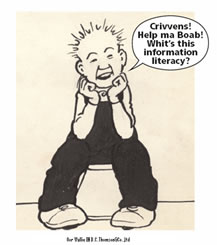Developing A National Information Literacy Framework (Scotland)
Research undertaken by Glasgow Caledonian University Information Literacy Skills - the link between secondary and tertiary education has shown that students arriving at university have generally either poor or limited information literacy skills, for some these skills will be enhanced but many will leave as they arrived. The findings from a recent small based exploratory interview study into 'The role of information literacy in addressing a specific strand of lifelong learning: the work agenda' indicated that although employers do not explicitly ask for information literacy it is implicitly expected, seen as important at work but not included in workplace training. It therefore falls to education to provide future employees with information literacy skills and competencies. The development of a national overarching framework of information literacy skills and competencies which all sectors of education can recognise and develop or which can be applied to the world of work, equipping learners with skills needed for the 21 st century is seen as a key tool for the embedding of information literacy in schools, FE, HE, and lifelong learning and for life.
The framework was developed with cross-sector partners and aims to:
- define information literacy learning in terms of statements of skills, knowledge and understanding
- support a continuing learning process through identifying a learning pathway within the context of SCQF (Scottish Credit Qualification Framework) as part of an educational guidance or personal development planning process
- map the existing learning that is taking place allocating a notional level to learning outcomes utilising relevant reference points such as the SCQF generic level descriptors with the intention of providing a general shared understanding of each level which can then be linked to academic, vocational or professional practice
- enable the notional levelling process and outcomes to become transparent and clearly understood by other learning providers, receiving organisations and or employers to meet the needs of the lifelong learner more effectively
- incorporate and highlight CILIP's information literacy skills and competences definition and SQA's Information Handling Skills Intermediate 2 qualification .
The target audience for the framework is:
- library and information professionals working in learning and teaching environments / organisations
- learning and teaching organisations e.g. Learning and Teaching Scotland, learndirect Scotland
- organisations involved in qualifications and accreditation e.g. CILIP, SQA
The draft framework was divided into the following sections:

- Schools
- Secondary Schools / Further Education Colleges
- Further / Higher Education
- Higher Education
- Lifelong learning including all information-using communities
e.g. community learning and in the workplace
The different sections have common skills running through them as highlighted by the diagram of the different models and definitions used to construct / develop the framework. Although there are differences in the grouping and wording of these skills, the commonality enables these skills to be learnt / developed at different levels within different sectors for information tasks appropriate for that level then further developed to the level other sectors require, thus creating a learning pathway for education or personal development planning process.
 Project Supported by the Eduserve foundationThe draft framework was presented at several events and initial feedback from the piloting exercise and online evaluation survey can be viewed within the brief end of award report for Eduserv. The drafting of the framework and the piloting exercise were both funded by Eduserv.
Project Supported by the Eduserve foundationThe draft framework was presented at several events and initial feedback from the piloting exercise and online evaluation survey can be viewed within the brief end of award report for Eduserv. The drafting of the framework and the piloting exercise were both funded by Eduserv.
The next stage was funded by the Esmée Fairbairn Foundation and included the restructuring of the framework and increasing the usage of the framework in Schools (including linking CfE draft learning outcomes and experiences, teacher CPD activities and initial teacher training) plus reviewing the role of information literacy in the workplace.

